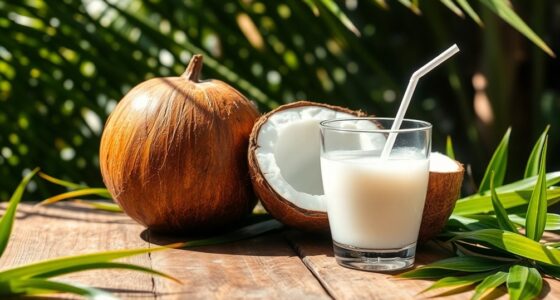Real lemon juice lasts about 3 to 4 days in your refrigerator if you’ve freshly squeezed it and stored it in an airtight container. If you’ve got unopened commercial lemon juice, it can last up to a year in your pantry. Once you open it, be sure to refrigerate and use it within 6 to 12 months for the best quality. Want to know more about storage tips and spoilage signs? Keep on exploring! To maximize the shelf life of your lemon juice, it’s important to know how to store lemon juice properly. Always keep it in a cool, dark place and ensure the container is tightly sealed to prevent exposure to air. Additionally, if you have leftover juice, consider freezing it in ice cube trays for later use, which can help retain its freshness for several months.
Key Takeaways
- Freshly squeezed lemon juice lasts about 3 to 4 days in the refrigerator when stored in an airtight container.
- Unopened lemon juice can last up to 1 year in the pantry without refrigeration.
- After opening, lemon juice should be refrigerated and used within 6 to 12 months.
- Freezing freshly squeezed lemon juice can extend its shelf life to about 6 months.
- Signs of spoilage include sour smell, cloudiness, and off taste; discard if these are present.

When it comes to preserving the freshness of real lemon juice, understanding its shelf life is crucial. Freshly squeezed lemon juice is a vibrant addition to many dishes and drinks, but it doesn't last forever. Typically, when you store freshly squeezed lemon juice in an airtight container in the refrigerator, it lasts about 3 to 4 days. This short shelf life is a vital consideration if you're planning to use it for your recipes or health benefits.
If you leave it out at room temperature, it should never be left unattended for more than 1 day to avoid spoilage.
Now, if you happen to have an unopened bottle of lemon juice, you're in luck. It can last for up to a year when stored in the pantry. However, once you open that bottle, it's essential to refrigerate it. You should aim to use it within 6 to 12 months. The shelf life of citrus products can be quite different, and knowing how to store them properly can save you from wasting that zesty goodness.
If you find yourself with more freshly squeezed lemon juice than you can use in a few days, consider freezing it. This is a fantastic way to preserve the juice for longer periods. You can freeze lemon juice in ice cube trays, allowing you to store it for up to 6 months without significant loss of quality.
Once frozen, you can transfer the lemon juice cubes to a freezer bag or an airtight container. This method not only helps retain the taste and smell of the lemon but also makes it easy to thaw just the right amount when you need it.
It's essential to be aware of the signs of spoilage when using real lemon juice. If you notice a sour or fermented smell, cloudiness in the liquid, or a taste that's off, it's best to discard it. Consuming spoiled lemon juice can lead to unpleasant experiences, and you certainly don't want to compromise your health.
Frequently Asked Questions
Can Real Lemon Juice Go Bad?
Yes, real lemon juice can go bad.
If you've squeezed it fresh, it'll only last a few days in the fridge, and a day at room temperature.
You should watch for signs like off smells, darker color, or a sour taste—those indicate spoilage.
If you consume spoiled juice, you might face health risks like nausea or stomach cramps.
Always check the juice before using it to ensure it's still good.
Is Bottled Lemon Juice as Good as Fresh Lemon Juice?
Imagine biting into a sun-kissed lemon, the tangy juice bursting with flavor.
Bottled lemon juice, while convenient, often falls short of that vibrant taste. Its pasteurization process dulls the bright notes you'd find in fresh juice.
If you're after that zesty punch in your dishes or drinks, fresh is the way to go.
However, when fresh isn't available, bottled juice can still work in a pinch—just don't expect the same zest!
Does Real Lemon 100% Lemon Juice Need to Be Refrigerated?
Yes, Real Lemon 100% Lemon Juice does need to be refrigerated after you open it.
Keeping it chilled helps maintain its quality and freshness. If you leave it out, the juice can spoil faster due to oxidation.
Make sure you seal it tightly in the fridge to preserve its flavor and prevent any spoilage.
Even in the fridge, check for signs of off smells or cloudiness to ensure it's still good to use.
How Long Can You Keep Lemon Water Before It Goes Bad?
You should ideally consume lemon water within 24 hours if it's stored at room temperature.
If you refrigerate it, it can last up to 3 days, but the flavor might start to fade after the first day.
Always check for cloudiness or any off smells, as these are signs it's gone bad.
To keep it fresh longer, use an airtight container and drink it up quickly!
Conclusion
In conclusion, real lemon juice can last about one week in the fridge once opened, much like a fleeting summer breeze. If you want it to last longer, consider freezing it in ice cube trays for future use. Always check for any off smells or changes in color, as these can signal spoilage. By keeping an eye on your lemon juice, you can ensure it stays fresh and flavorful for your culinary adventures.
Cindy thoroughly researches juicing trends, techniques, and recipes to provide readers with practical advice and inspiration. Her writing style is accessible, engaging, and designed to make complex concepts easy to understand. Cindy’s dedication to promoting the advantages of juicing shines through her work, empowering readers to make positive changes in their lives through the simple act of juicing.











